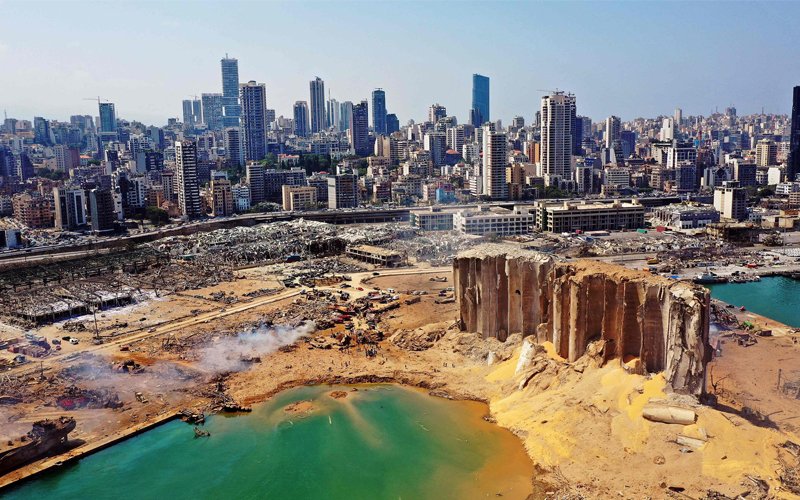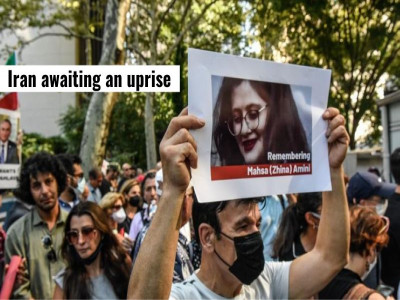
Beirut has fallen ?
Lebanese army bulldozers plowed through wreckage to reopen roads around Beirut's demolished port Thursday, a day after the government pledged to investigate this week's devastating explosion and placed port officials under house arrest.
The blast Tuesday, which appeared to have been caused by an accidental fire that ignited a stockpile of ammonium nitrate at the port, rippled across the Lebanese capital, killing at least 135 people, injuring more than 5,000 and causing widespread destruction.
It also may have accelerated the country's coronavirus outbreak, as thousands flooded into hospitals in the wake of the blast. Salah Zeineldine, a doctor of pulmonary and critical care at the American University of Beirut Medical Center, told CBS News that the country was already weakened by a severe economic crisis as well as the COVID-19 pandemic. He said that up until now hospitals had sufficient supply to treat patients — but added that after the blast, hospitals might start to run short on equipment.
"We fear that what was functioning yesterday won't function tomorrow," he said. "Last night's tragedy was one of the worse known to mankind, excluding wars."
Pamela Makhoul, a nurse at Saint George Hospital, told CBS News that all patients were evacuated to other hospitals after they received basic care.
"The situation is a disaster," she said Wednesday. "There's nothing left."
Hundreds of thousands have been forced to move in with relatives and friends after their homes were damaged, further raising the risks of exposure.
French President Emmanuel Macron arrived Thursday amid pledges of international aid, and tweeted that "Lebanon is not alone." He planned to visit the devastated port and meet with top officials.
But Lebanon, which was already mired in a severe economic crisis, faces a daunting challenge in rebuilding. It's unclear how much support the international community will offer the notoriously corrupt and dysfunctional government.
Losses from the blast are estimated to be between $10 billion to $15 billion, Beirut Gov. Marwan Abboud told the Saudi-owned TV station Al-Hadath on Wednesday, adding that nearly 300,000 people are homeless.
The tiny Mediterranean country was already on the brink of collapse, with soaring unemployment and a financial crisis that has wiped out people's life savings. Hospitals were already strained by the coronavirus pandemic, and one was so badly damaged by the blast it had to treat patients in a nearby field.
Dr. Firas Abiad, director general of Rafik Hariri University Hospital, the public hospital leading the coronavirus fight, said he expects an increase in cases in the next 10 to 15 days linked to crowding at hospitals and blood donation centers after the blast.
Authorities had largely contained the outbreak by imposing a sweeping lockdown in March and April, but case numbers have risen in recent weeks. A renewed lockdown was to go in effect this week but those plans were canceled after the explosion. The country has reported more than 5,400 coronavirus cases and 68 deaths since February.
"There is no doubt that our immunity in the country is less than before the explosion and this will affect us medium- to long-term," Abiad said. "We desperately need aid, not only us but all hospitals in Lebanon."
Anger is mounting against the political class that has dominated the country since the 1975-1990 civil war, which has long been seen as hopelessly corrupt and incapable of providing even basic services like electricity and trash collection.
The investigation into the explosion is focused on how 2,750 tons of ammonium nitrate, a highly explosive chemical used in fertilizers, came to be stored at the port facility for six years, and why nothing was done about it.
The Port of Beirut and customs office are notorious for being among the most corrupt and lucrative institutions in Lebanon, where various factions and politicians, including the Iran-backed Hezbollah militant group, hold sway.
Fueling speculation that negligence was to blame for the accident, an official letter circulating online showed the head of the customs department had warned repeatedly over the years that the stockpile of ammonium nitrate was a danger and had asked judicial officials for a ruling on a way to remove it.
The cargo had been stored at the port since it was confiscated from a ship years earlier. Based on the timeline and the size of the cargo, that ship could be the MV Rhosus. The ship was initially seized in Beirut in 2013 when it entered the port due to technical problems, according to lawyers involved in the case. It came from the nation of Georgia, and had been bound for Mozambique.
The stockpile is believed to have detonated after a fire broke out nearby. It caused the most powerful blast ever seen in the city, which has survived decades of war and conflict. Several city blocks were left littered with rubble, broken glass and damaged vehicles.
Authorities have cordoned off the port itself, where the blast left 200 yards across and shredded a large grain silo, emptying its contents into the rubble. Estimates suggested about 85% of the country's grain was stored there. Lebanon is highly dependent on imports, and the destruction of the port, along with the worsening cash crisis, have raised fears of shortages.
Two planeloads of French rescue workers and aid were sent to Beirut, as Macron offered support for the former protectorate. The countries retain close political and economic ties.
Other countries, including Greece, Qatar, Kuwait, Turkey and the European Union, have dispatched medical supplies, humanitarian aid and search-and-rescue teams.
Disclaimer: The opinions expressed in this article are those of the author's. They do not purport to reflect the opinions or views of The Critical Script or its editor.

Newsletter!!!
Subscribe to our weekly Newsletter and stay tuned.

















Related Comments